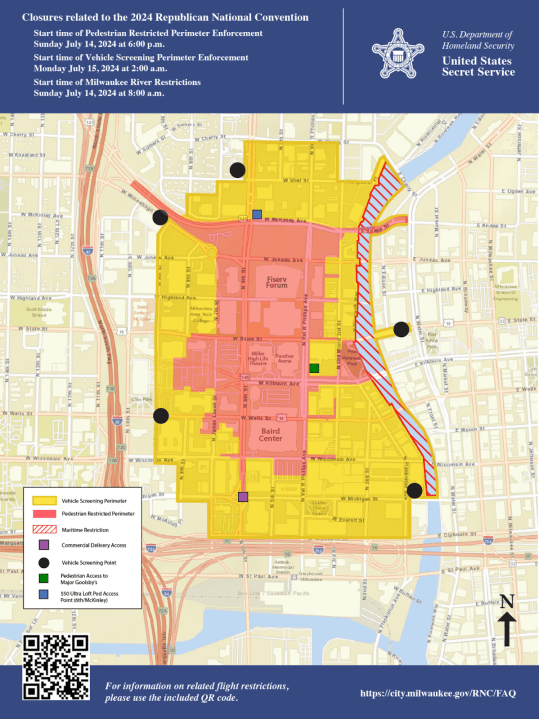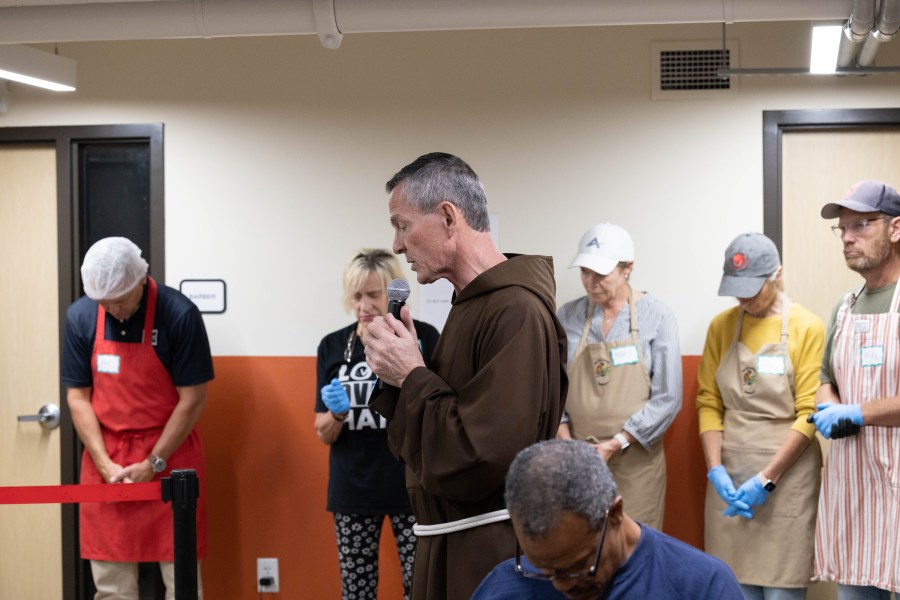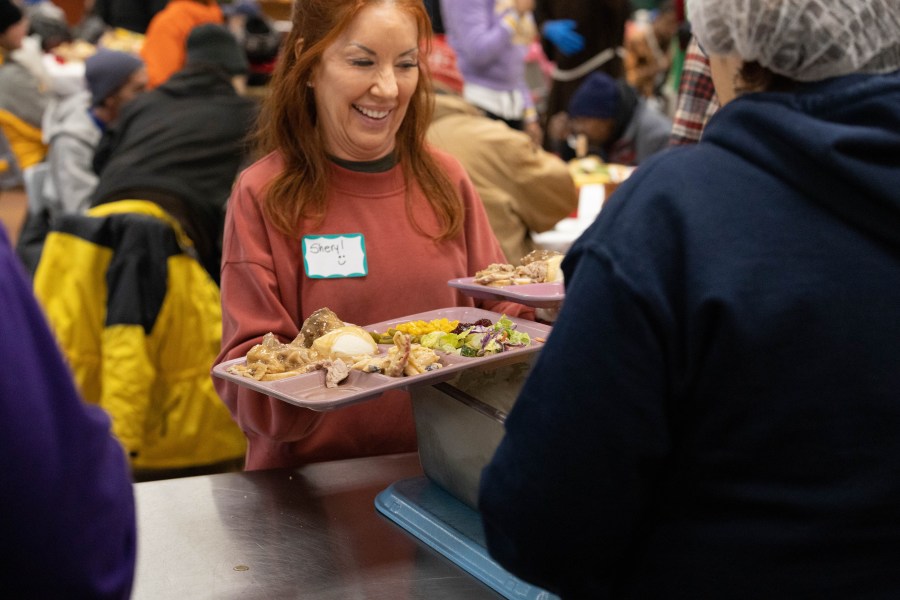(NewsNation) — As the Republican National Convention takes over the city of Milwaukee, Wisconsin, those in charge of local organizations aimed at helping homeless people are concerned the unhoused could be pushed out and forgotten.
Fifty thousand RNC attendees will flood Milwaukee’s Fiserv Forum over four days next week, culminating with former President Donald Trump being confirmed as the GOP nominee for the White House. Much of the downtown area will be closed off, meaning those who sleep in shelters, tents, cars and on city streets will have to go elsewhere.
“When events like conventions like this occur in so many cities, what happens?” Father Mike Bertram of Capuchin Community Services in Milwaukee told NewsNation. “The city hoards up all who are poor and carts them out to some distant area that they’re unfamiliar with. We just feel that our poor, (and) our guests, deserve something better than that. They deserve to be treated in a humane manner.”
Many of the support centers the city’s homeless people rely on for food and shelter are located in and around the RNC restricted zone, which surrounds the venues hosting convention events.

With so many cut off from access to the places they frequent for services, community organizers like Eva Welch, the co-founder of Street Angels, are concerned that Milwaukee’s most vulnerable will face more stress than normal.
“It can be detrimental,” Welch told NewsNation. “(Those places are) where they get their food and water and if it’s in that restricted area, what are they going to do?”
Helping Milwaukee’s homeless population
Several organizations have increased their efforts following the increase and plan to work around the clock over the next week. Street Angels serves about 300 unhoused individuals each night. Its volunteers travel by bus to provide mobile homeless support services, with volunteers working until 1 a.m. several nights a week to meet people where they are.
Capuchin Community Services offers hot meals, shelter, haircuts, and free laundry services to the unhoused. It sits on the border of the downtown area and will be open during the RNC.
Bertram, the group’s ministry director, has praised the effort between city and county officials and charitable service providers to continue serving the poor and unsheltered. But he says the RNC’s presence poses a different kind of challenge.
“It’s a process and experience that changes sometimes day-to-day and hour-by-hour,” Bertram said. “A national convention of the Republicans is something pretty new to us. It’s exciting, it’s a wonderful prospect, but it certainly makes for a lot of preparation and sometimes going with the flow and making the changes that are necessary every day.”
What is Milwaukee County doing?
Milwaukee County will operate a downtown cooling center that will provide homeless services 24 hours a day within blocks of the restricted zone.
The goal for those who provide services is to continue to do so as uninterrupted as possible.
Officials are boosting efforts to ensure the most vulnerable have access to shelter and other resources, according to a spokesperson for the county executive’s office.
The spokesperson said there will also be a street research presence to support anyone living on the street in the convention area and ensure they have immediate access to resources and a place to stay overnight.
Additionally, Capuchin will make its 60-person winter shelter available next week, partnering with county officials to ensure services are not interrupted.
Meanwhile, in Chicago, which will host next month’s Democratic National Convention, city officials have already shut off Chicago’s largest and most visible tent encampment for homeless people more than a month before the event at the United Center.
Brandie Knazze, the commissioner of Chicago’s Department of Family and Support Services, told the Chicago Sun-Times that 22 people who have been living about two dozen tents near the Dan Ryan Expressway, will be moved to a city-run shelter. The city closed down and cordoned off the tent city this week, the newspaper reported.
Knazze told the Sun-Times that the move was made ahead of the homeless being forced to leave the area by federal authorities ahead of the DNC. She said she wanted the move to be “thoughtful” and in a way that’s not disruptive.
How Milwaukee’s homeless population has changed
Milwaukee County was once lauded as a national leader in combating homelessness after it registered zero chronically homeless individuals in both 2022 and 2023, meaning that no one went unsheltered and without services for more than a year, according to local media reports.
But the problem has crept back up. Wisconsin reported a 14.3% increase in unsheltered families between 2022 and 2023, according to the U.S. Department of Housing and Urban Development, which provided more than $5.4 million in grants to the state this year.
Statewide, 4,861 individuals in Wisconsin are homeless, including 1,056 from Milwaukee County as of 2023, according to the Wisconsin Policy Forum.

Milwaukee was set to host the Democratic National Convention in 2020 before the event was severely scaled back due to the COVID-19 pandemic.
Four years later, inflation has ravaged the local housing market and limits affordable options.
Additionally, the stigma of what it means to be poor, homeless or living with mental illness remains, especially as the city prepares for the national spotlight, support group leaders say.
“Let’s face it. The friends that we serve, they’re not stupid,” Street Angels Co-Director Shelly Sarasin said. “They’re homeless, but they know what’s going on.”
“They completely understand that certain leaders would prefer (it) if they were just invisible. And I’m sure that doesn’t feel good,” Welch said.
Multiple small-to-medium-sized tent communities have emerged in and around the downtown area, and a 100% increase in people living in cars over the past year has occurred.
In some cases, this has required Street Angels to shift some of its mobile routes to continue to provide care away from the restricted zone of downtown.

Street Angels has already started instructing clients where they can find services during a week when the convention will throw off normal routines.
While planning efforts have remained intentional, the presence of a restricted zone can complicate strategies, adding to the level of concern for those overseeing local efforts.
“We’re on the cusp of our city shutting down for services and (local officials) not really thinking about our most vulnerable,” Sarasin said.
But the convention is an opportunity to lead by example, Bertram said, who has been pleased with the response from the county thus far.
“This makes Milwaukee look awfully good in terms of how it really cares about everybody, rich and poor alike,” Bertram said.






